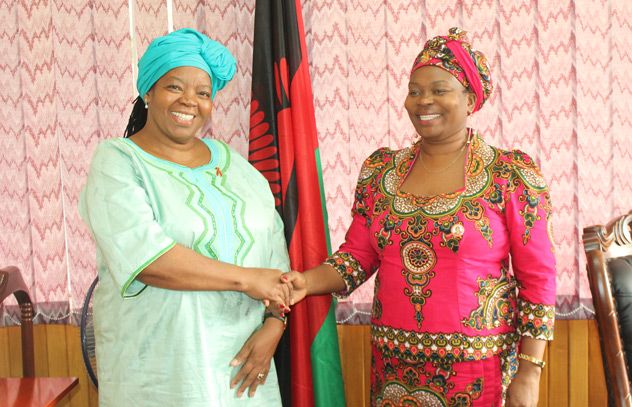

Sheila Tlou, Director, UNAIDS Regional Support Team for Eastern and Southern Africa (left) with Catherine Gotani-Hara, Malawi Minister of Health.
Update
Malawi government commits to scale up HIV prevention programmes to reduce new HIV infections
05 March 2014
05 March 2014 05 March 2014The government of Malawi, in collaboration with its partners, is revitalizing its national prevention strategy to scale up HIV prevention programmes, particularly for people most affected by the epidemic.
In the last decade, Malawi has become a global leader in preventing new HIV infections among children, in part thanks to the establishment of its treatment programme for pregnant women living with HIV. In 2012, new HIV infections among children had declined to 11 000 compared to the 28 000 in 2001. Estimated AIDS-related deaths also decreased from 86 000 in 2001 to 46 000 in 2012.
However, despite the progress made—there were 40% fewer new HIV infections in the country in 2012 compared to more than a decade ago—around 180 new HIV infections are still occurring every day in Malawi.
To reduce the number of new infections, the Government has developed a road map to improve the national HIV prevention strategy. The plan include key mile stones such as undertaking an analysis of the existing programmatic and financial gaps on HIV prevention; collecting community perspectives through community dialogues with couples, young women and girls and sex workers; and creating a Think tank to reach consensus on the innovative strategic directions to apply on HIV prevention.
During her visit to the country on 25 February, Sheila Tlou, Director of UNAIDS Regional Support Team for Eastern and Southern Africa stressed the importance to revitalise the national AIDS plan to reach vulnerable populations with proven and sustainable HIV prevention programmes, including voluntary male circumcision.
Quotes
“We acknowledge the challenges we have when it comes to new infections but Malawi is committed to build on its results and not regress on its gains.”
“Malawi needs to turn off the tab on new HIV infections. We have to protect women and girls from getting infected with HIV by keeping girls in school, increasing the legal marriage age, and ending violence against women and girls.”
Related
 “Who will protect our young people?”
“Who will protect our young people?”

02 June 2025
 Impact of US funding cuts on HIV programmes in Malawi
Impact of US funding cuts on HIV programmes in Malawi

15 April 2025

